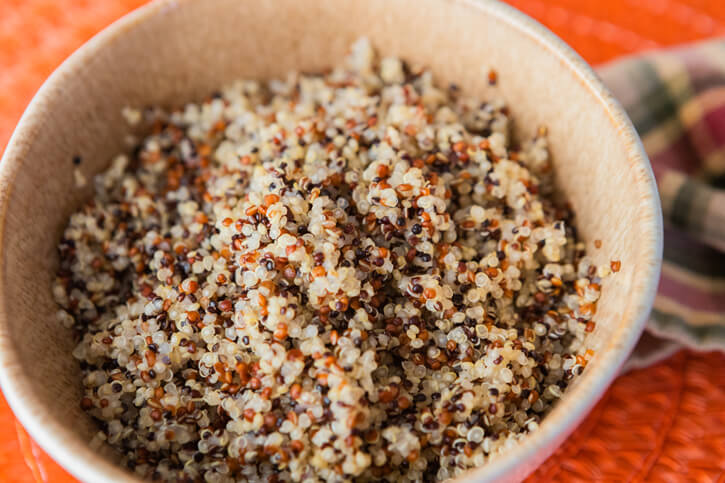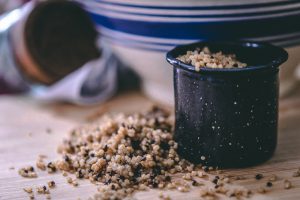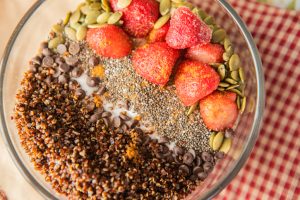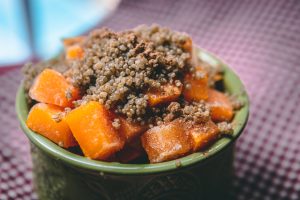You have probably heard about quinoa and it’s superfood-like health benefits, but perhaps haven’t gotten around to figuring out how to prepare it or maybe skipped past it down the health food aisle in the grocery store. There are many reasons why this little seed, which appears like a grain similar to rice, should be a regular staple in everyone’s diet. From being a perfect protein, to increasing your nutrient intake, the list can go on and on.
Here are 5 stand out reasons why you should give quinoa a try and consider it part of your regular meal planning.
1. Quinoa is a Perfect Protein
There aren’t many food items out there that are considered a whole or “perfect” protein. What that means is that it is considered a complete protein, containing all of the nine essential amino acids that our bodies need, but cannot make on their own. There aren’t many foods that are categorized as perfect or complete proteins, so that really makes quinoa a super protein and stand-out choice!
2. Quinoa is a Superfood
Speaking of being super, this ancient grain is also considered to be a superfood as well. The reason for this classification is easy: quinoa is jam packed with not just protein, but it is high in fiber and also contains lots of vitamins and minerals. It also has impressive amounts of magnesium, B-vitamins, potassium, iron, phosphorus, calcium, vitamin E, amongst others. It has been around for so long, that its health benefits have been verified and it’s easy why it is a popular staple for most people.
3. Quinoa is Low on the Glycemic Index
Since quinoa is a low glycemic index food, meaning your body uses its energy slowly and over time, it is recommended for people who seek diets which are lower in carbs or are looking for foods to add to a diet in order to lose weight and improve health. Some individuals who suffer from Type-2 diabetes, for example, are often advised by their physicians to consume less carbs and add low glycemic choices to their daily diets. Quinoa is a clear winner for anyone seeking low GI foods that also check boxes off in the fiber and protein departments as well.
4. Quinoa is Gluten-Free
Quinoa is one of the grain-like seeds that many people think is a carbohydrate type of food like rice, but the key difference is that it is totally free of gluten. Many people have allergies to gluten or suffer from illnesses such as celiac disease which increases their need for alternate “grains” to eat. For some who previously enjoyed wheat-based cereals, they can simply grab cereal that’s made with quinoa. Someone eating a breakfast dish with quinoa such as quinoa flakes or gluten-free muesli can easily avoid the gluten that has impaired their health while seeing the positive benefit that adding additional fiber and higher protein content.
Quinoa is also packed with sufficient levels of amino acids, making this a superb choice for those who have had to eliminate gluten and are concerned that their amino acid levels might drop (since a lot of wheat foods may be enriched with vitamins and amino acids). Note that if dealing with an allergy, it is important to shop for certified gluten-free quinoa, to avoid cross contamination.
5. Quinoa Contains Important Plant Flavonoids
Flavonoids are plant compounds, or are otherwise known as antioxidants, that have been shown to offer people with many health benefits. Experts who study nutrients and flavonoids in foods, have discovered that high levels of two very vital flavonoids called quercetin and kaempferol are in quinoa. The antioxidant quercetin is so high in quinoa that it has more of the antioxidant quercetin that even cranberries do!
Antioxidant flavonoids have been shown to have many properties that aid in health, including anti-inflammatory, anti-viral, and anti-cancer effects, just to name a few. Including more quinoa in your daily diet, will certainly help to add more antioxidants and their healthful benefits to you as well.
Wondering how to add quinoa to your diet or even how to prepare it? Check out the comprehensive guide to this powerful, superhero seed in my book The Complete Quinoa Cookbook. You will find yourself engulfed in quinoa’s rich history, learning more health facts, discovering how to be environmentally responsible when choosing quinoa products as well as getting over 100 user friendly and delicious recipes. The recipes in the book range from breakfast, lunch, dinner, snacks, desserts and more. Quinoa is not just a super seed, but also a tasty and versatile one as well!
Catherine Gill is a writer, blogger, and holistic vegan chef who specializes in natural and health foods. She studied and found her passion in writing, literature, and social science in college. She runs the popular blog The Dirty Vegan since 2010, focusing on comfort-food-style vegan recipes that are fun, accessible, and healthy. She also ran Dirty Vegan Foods, a vegan bakery specializing in veganized versions of classic desserts. She has an active social media presence with over 28K followers on twitter (@TheDirtyVegan) and over 10K on instagram (@thedirtyvegan_official). She currently resides in New England with her husband, daughter, and rescue dog. She is the author of The Dirty Vegan Cookbook, The Complete Hummus Cookbook, and The Complete Quinoa Cookbook.









